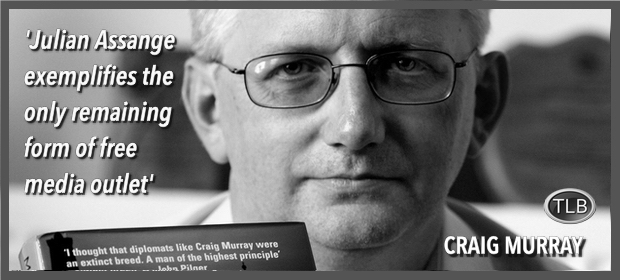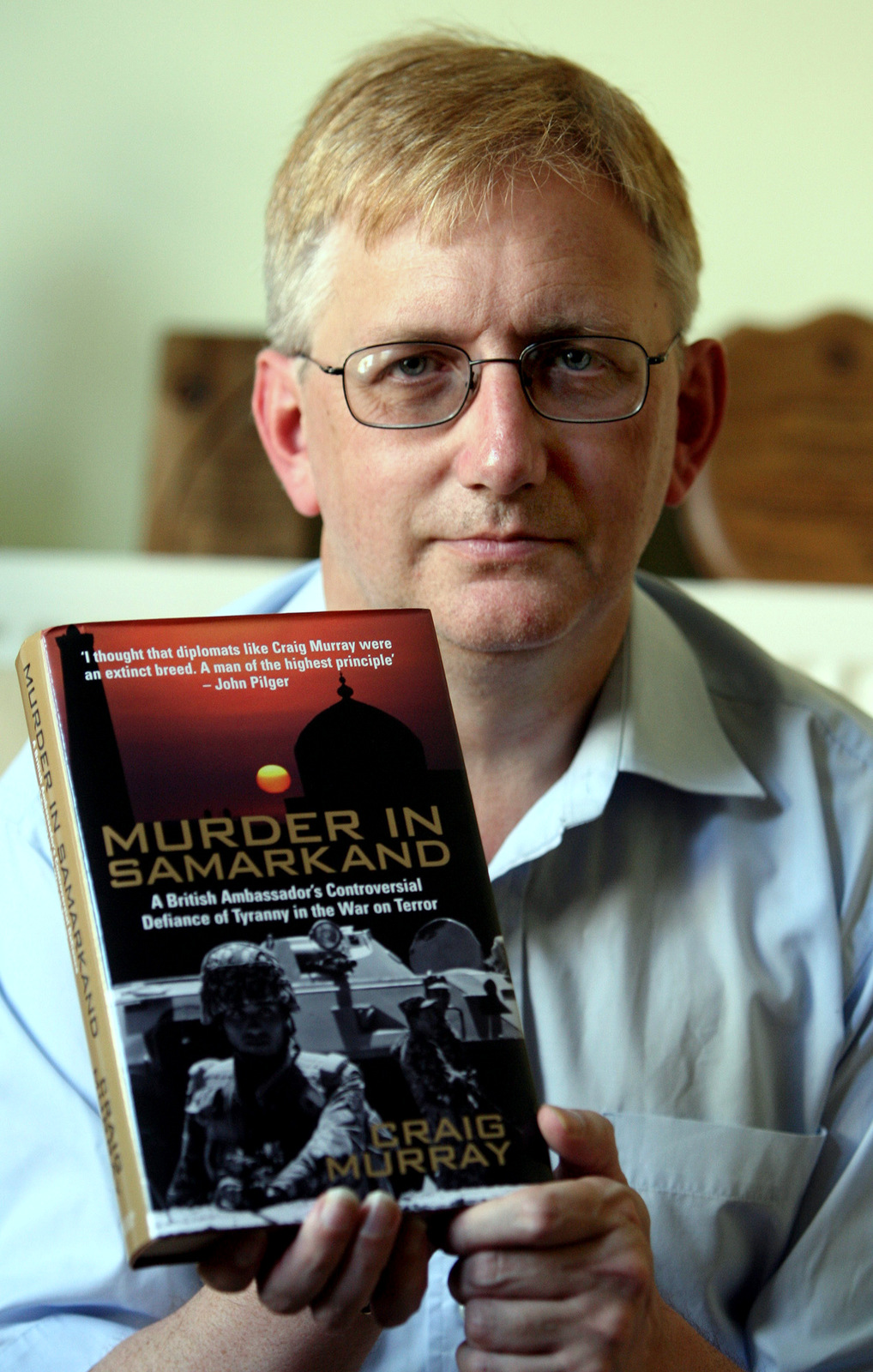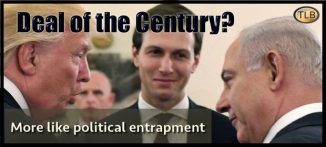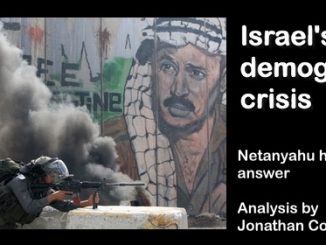
Former British Ambassador Weighs in on Assange, Russia Hacking and Israel
Former British Ambassador Craig Murray weighs in on the current situation with Julian Assange, the alleged Russian election hack, Trump’s Israel embassy move and more with Consortium News’ Randy Credico and Dennis J Bernstein.
RANDY CREDICO & DENNIS J. BERNSTEIN
Craig Murray is an author, broadcaster and human rights activist. He was British Ambassador to Uzbekistan from August 2002 to October 2004, and Rector of the University of Dundee from 2007 to 2010. Murray’s books include Zionism is Bullshit–censored on Facebook–and Murder in Samarkand. He is a self-proclaimed defender and strong supporter of the work of Julian Assange as one of the most significant “Publishers” of our time.
Randy Credico: The last time we spoke, Craig, you were involved in a libel suit which I believe had a positive outcome for you. Even as we spoke, you were en route to London to defend yourself from the suit brought against by a gentleman you called a liar, after he publicly called you an anti-Semite because of your criticism of Israel and the ongoing ethnic cleansing there against the Palestinians. I understand that the suit was dropped just as the case was getting underway. But it cost you a pretty penny before it was over.
Craig Murray: Unfortunately, while I didn’t lose the case, I still ended up having to pay my lawyers. Libel suits are incredibly expensive in the UK, which is why they are used by corporations and the wealthy to silence ordinary people. My legal bills came to well over $100,000. Lucky for me, there were over 5,000 individuals who subscribed to our defense fund and that paid the bill for me. But it is frightening because ordinary people are terrified to write anything critical of the wealthy and powerful.
RC: I was there right after your suit ended. I was covering Stefania Maurizi’s suit in the high court to get email transmissions from the Crown Prosecution Service to both Sweden and the US concerning Julian Assange. She made a great case, but in the end, they sided with the prosecution. Is the system totally rigged there, or is it libelous to say that?
CM: It is fair to say that the establishment stick together. In fact, I believe that the government and the judiciary are closer here than they are in the United States to some extent. There is quite a closed circle of the ruling class. They attend all the same schools and they are closely linked in various ways. So once you take on the establishment, you are taking on the entire establishment.
RC: So they are protecting the US government but they are protecting themselves as well. The UK was involved in a lot of the things that Assange exposed–the war logs and some of the cables. Is the motivation to keep him quiet so that the exposures don’t continue?
CM: Yes, and the corporate press is part of the same nexus and control the public’s access to judicial proceedings. Wikileaks very much threatens this control of government information. Wikileak’s motto is “we open governments” and that is very true.
Dennis Bernstein: I’d like to talk a little more about Julian Assange’s situation. We know that the powers that be try to undermine the spirit as best they can. To date they have been unable to stop Julian from continuing this work for the people. We know he is facing health problems now. How do you assess his condition and what could happen at this point?
Former British Ambassador Craig Murray with his book, Murder in Samarkand. Murray was the British ambassador to Uzbekistan until he was removed from his post in October 2004 for exposing human-rights abuses by the US backed regime of President Islam Karimov. (AP/Simon Dawson)
CM: I last met Julian in the embassy a little over two weeks ago. I am not a medical person but medical professionals now say he is in serious condition, both medical and psychological, from the effects of his confinement. He has a single room which is about twelve square feet and a smaller room where people from Wikileaks sometimes work with him. The entire Ecuadorian embassy in London is just an apartment.
Julian gets no daylight at all. He doesn’t like to go near the windows because of the threats which have been made against him. He gets no outside exercise, which even the worse prison offenders are allowed for a short period every day to get some fresh air and stretch their legs. This kind of confining existence is a real health danger. In addition, there is the indeterminate nature of the whole thing, which is bound to have a severe psychological effect, not having any idea when he is going to be let out.
But having said all that, I have not seen any diminution in his intellectual abilities. In fact, he seems to be even more honed in on the issues of the day. He is extremely well informed on political and social developments and an extremely shrewd analyst. I don’t want people to worry about him in that way. But he looks pale and he is obviously not in a healthy state. The dangers of decline are definitely there.
DB: The current Ecuadorian government, which would really like to earn some good favor in the United States, could become a very dangerous entity to Julian Assange.
CM: In general, Ecuador has been fantastic in what they have done for him. Ecuador is a small country and like most countries in Latin America is vulnerable to pressure from the United States. The political situation there has changed and the left is not in the position it was five or six years ago. There is a heavy CIA presence there, both overt and covert. So I don’t criticize the Ecuadorian government, they’re in a very difficult position.
DB: Facebook has not taken kindly to your recent critique of Zionism. What did they say?
CM: An editor has very kindly taken on the task of collecting earlier articles of mine into a book. They include a speech I gave after one of the big Israeli attacks in Gaza. I actually gave the speech in front of a crowd of 350,000 people in Hyde Park. That’s when I first used the phrase “Zionism is bullshit,” which became the title of the book.
Facebook took down ads for the book, claiming that they objected to the profanity, which is kind of funny because it is a word that appears quite often on Facebook. Later they claimed that the book was banned because the title denigrated a religion. Of course, Zionism is not a religion but a political movement. Many religious Jews do not support Zionism. If I don’t agree with a political position I should be able to say so as plainly as I wish.
DB: The current US administration plans to move the US embassy from Tel Aviv to Jerusalem. Would that be in keeping with Zionist policy?
CM: Look, my own ancestors were primarily Celtic and we know that 3,000 years ago the Celtic people resided in places like present-day Switzerland. Just because 3,000 years ago some people believed that God gave Jerusalem specifically to the Jewish people, that doesn’t mean that you ignore the next 3,000 years and the place should become the capital of Israel based on biblical references. The idea that the rights of the Palestinian people can be ignored because of religious text written down thousands of years ago is absolutely ludicrous.
The Palestinians have had a dreadful time over the last ten years. Not only have they periodically suffered completely disproportionate military attacks but they continue to suffer the appropriation of their land and the destruction of their buildings and farms, with more and more Israeli settlements being built on Palestinian land, to the extent that a two-state solution is no longer viable because so much of what would be the Palestinian state is now Israeli settlements, containing hundreds of thousands of people.
To declare Jerusalem the capital of the Israeli state is going to be a major handicap to any future peace settlement. It is something that the entire international community has resisted doing. It really does set back progress on the Israel/Palestine issue, doing nothing for the cause of peace or for Israeli security. This is being done to gain domestic political advantage in the United States with the Christian Evangelical lobby.
RC: Julian Assange has now been granted citizenship as well as diplomatic status by the Ecuadorian government. But the British government refuses to recognize this diplomatic status.
Again, the Vienna Convention is absolutely clear that, from the moment of notification, that person enjoys diplomatic immunity. The host state doesn’t have to accept the person, they can declare him or her persona non grata and the person then has to leave the country within a reasonable period of time. But they have diplomatic immunity from the moment of notification until they leave.
CM: Now it gets a little technical. Under the Vienna Convention on Diplomatic Relations, if you appoint an ambassador, that ambassador has to be approved in advance by the host country. If you appoint a diplomat to the embassy below the level of ambassador, you don’t have to seek agreement in advance. All you have to do is notify. And Ecuador notified the British government of its decision to grant Assange diplomatic status.
The whole point of diplomatic immunity is to prevent foreign states from effectively kidnapping your diplomats in order to extort from them your country’s secrets. So the British government should have to allow Assange to leave the country and he should have immunity while he leaves, but they have stated that they would arrest him if he leaves the embassy.
The remedy would be for Ecuador to take the United Kingdom to the International Court of Justice to oblige the UK to follow international law in this regard. Whether Ecuador is prepared to do that, I don’t know. It would require significant legal resources and time and cost a certain amount of diplomatic capital.
Another option would be, were he to be arrested, his lawyers could take his case to the courts in the UK. But we have spoken already of the close ties between the British courts and the government and whether he could succeed is an open question. The fear is that immediately an extradition request would come in from the United States.
DB: The fact is, Julian Assange is a political prisoner who has made an extraordinary practice of monitoring centers of power. They are going to do whatever they can to bring him down. The only real way to save Assange is for the people to be made aware and for them to rise up and prevent the UK government from doing this because this person has performed a great public service on many fronts in many countries.
CM: You are absolutely right. He is being persecuted by governments because of the tremendous journalism he has published. It is ironic that at the moment Hollywood is bringing out a film called The Post about the Pentagon Papers and that is being celebrated at the same time that the entire establishment is out to get Julian Assange for publishing in exactly the way The Washington Post did.
Of course, The Washington Post has now given up on that and we no longer have a liberal media. The New York Times and The Washington Post are leading the calls for attacks on whistleblowers. Julian Assange exemplifies the only remaining form of free media outlet.
DB: You write in your recent piece “The Russians are Coming, the Russians are Coming”, “The complete and unmitigated irrationality of the current epidemic of Russia-phobia does nothing to reduce its incredible virulence as it continues to infect the entire political and media class.” That would include The Washington Post, wouldn’t it?
CM: In fact, the articles that The Washington Post has been spewing out for a year now on Russiagate and the alleged collusion between WikiLeaks and Russia have been quite remarkable to behold. They appear to have given up any journalistic standards in terms of truthful reporting, in terms of allowing people a chance to reply to their allegations, and in terms of doing any real investigation of the facts. The New York Times is probably just as bad on this story. They have both been astonishing in their inaccuracy.
It is difficult to explain what is happening. The political and intelligence communities have seen WikiLeaks as an enemy ever since the Chelsea Manning revelations. And then the political establishment was very alarmed by the challenges to Hillary Clinton, the first of which was the challenge posed by Bernie Sanders. Then WikiLeaks got a hold of emails from the DNC and Podesta which indicated that the entire playing field was being quite deliberately tilted against Sanders to make sure that he didn’t win. This, of course, added to Clinton’s unpopularity. All through the campaign opinion polls showed that Clinton was the only person who could possibly lose to Donald Trump. But the establishment made sure that she got the nomination. Already during the campaign she and her people identified Russia as the scapegoat.
So we have had the coming together of these factors: the hatred of WikiLeaks by the intelligence community, the military’s need for Russia as an enemy to justify the billions and billions in military spending, and the need of the so-called liberal left for a scapegoat for Hillary’s defeat. So you have this kind of perfect storm that has led people to concoct this imaginary scenario where Russia installed the president of the United States in collusion with Julian Assange.
DB: So again, was this a hack or a leak?
CM: It was definitely not a hack, not by Russia or anybody else. It was a leak of information legally downloaded from their servers. I know this because I am quite closely associated with WikiLeaks. But WikiLeaks never reveal their sources because they are totally focused on source protection.
RC: Is there an economic motivation here? Is there a Russiagate industry that has developed?
CM: We shouldn’t underestimate the NSA and their fantastic capabilities. People from inside the agency, such as William Binney and Edward Snowden, all say that if it were a hack, the NSA would have the technical ability to trace that data as it passed through the Internet. They would be able to tell you the exact second the hack occurred and where it went. There is no such data because it wasn’t a hack.
People tend to rationalize doing what makes their employers happy or what they consider to be to their advantage in terms of their career. That is a kind of economic motive, but I think it is largely subconscious. People do what they do to get ahead.
Of course, people at the top have a very definite economic motive. They are trying to maintain corporate control and the control of the political class through a process described by Noam Chomsky [and the late Edward Herman] as “manufacturing consent.” But I believe the foot soldiers subconsciously fall in with what they are supposed to do in order to keep their jobs.
RC: You just wrote a piece on Margaret Thatcher and her support for Apartheid in South Africa.
CM: It is interesting how the media airbrush history. One of the things which has been airbrushed out of Margaret Thatcher’s history is that she was a strong supporter of the Apartheid system. I have no doubt about this whatsoever because my first job as a foreign officer was at the South Africa desk as a political officer.
The entire two years I was there, we were trying to bring her to understand that Apartheid was evil and had to end. But this went against her strong personal instincts, which were to support Whites-only rule. She successfully opposed any sanctions against Apartheid South Africa. She refused to allow any of her government officials to talk to the ANC or to anybody representing Black people in South Africa.
I have been explaining this to people for many years, but people have tended to doubt me because I was going against the accepted narrative. I was very gratified last week that Sir Patrick Wright, the head of the foreign service at that time, published his diaries from that time, where he makes absolutely plain that Thatcher supported Apartheid and that he considered her a racist. I am happy indeed that the truth is starting to get out there.
But the other point is that there are many people in senior positions in the conservative party now–including our minister of defense who just resigned–who at the time were also strong supporters of Apartheid.
DB: Meanwhile, as we all know, Apartheid is alive and well in Israel/Palestine. Let us pray that the kind of forces that rose up to end Apartheid in South Africa will also bring pressure to end the situation in Palestine.
************
Original article
ER recommends other articles by MintPress News, and Consortium News where this article originally appeared
Featured Photo | Former British Ambassador Craig Murray. (AP/Simon Dawson)





